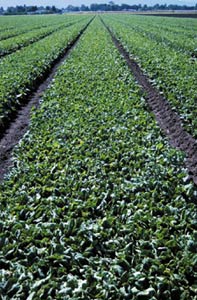U.S. FDA says spinach is safe
– but not from Salinas Valley
Morgan Hill – The investigation of Salinas Valley farms continues this week as health officials in Utah confirmed the discovery of a second bag of spinach contaminated with E. coli – and a Seattle company announced Monday it was recalling salad products in the Northwest linked to a California grower.
As of Monday, 175 E. coli illnesses had been reported nationwide in an outbreak traced to a food supplier in San Juan Bautista. There have been 92 hospitalizations and one death in 25 states, with two more deaths also strongly suspected to have been caused by the bacteria that breeds in animal guts.
Still, the U.S. Food and Drug Administration has declared fresh spinach safe to eat – as long as it doesn’t come from Northern California.
FDA officials followed leads last week to the supplier, Natural Selection Foods, which works with national brands including Dole, Trader Joe’s and Ready-Pac. A bag of tainted spinach found in New Mexico last week tipped investigators to the plant.
Investigators on Thursday extended their search to 10 farms in Monterey, San Benito and Santa Clara counties which do business with Natural Selection. According to the Associated Press, inspectors took more than 180 soil, produce and water samples from fields and processing plants in the Monterey, Hollister and Gilroy area.
Samples were taken to laboratories and results are due this week.
“Either there was a lot of spinach contaminated on the farm that was harvested at the same time, or there was some problem with the processing-packaging that allowed large quantities to be contaminated,” said Dr. David Acheson of the U.S. Food and Drug Administration’s Center for Food Safety and Applied Nutrition, speaking Thursday at a press briefing.
“Possibly there were further problems during distribution … that it wasn’t adequately refrigerated (therefore allowing) E. coli to grow,” Acheson added. “It’s certainly possible that several things happened at the same time. … One thing that was clear was that there was obviously a very large amount of spinach contaminated that was distributed to at least (25) states.”
Santa Clara County farms produce 1,100 acres of spinach annually with a market value of $3.2 million. California as a whole produces 74 percent of the nation’s fresh spinach crop, with the Salinas Valley accounting for roughly three-quarters of the state’s share. The region’s heavy agriculture has been linked to nine of the 19 E. coli outbreaks since 1995, according to the FDA.
On Monday, Triple B Corp., a Seattle company, recalled products with spinach that may have been supplied by Natural Selections Foods. In addition, Reuters reported Monday Chiquita Brands International suspended its cash dividend and may sell its shipping fleet as the spinach scare is expected to hurt quarterly profit. Chiquita is mainly known for bananas, but its Fresh Express business has experienced a sharp drop in sales since the FDA first warned of the E. coli outbreak about 10 days ago.
The FDA is now trying to avert hysteria by telling consumers fresh spinach is safe to eat – as long as it’s not from Salinas Valley crops.
Finding the source of the offending E. coli strain may prove impossible: none of the sources of the area’s previous nine outbreaks was ever pinpointed, said Mike Villanueva, government industry liaison with the Western Institute for Food Safety and Security, a consortium between the state Department of Human Services, the state Department of Food and Agriculture and the University of California, Davis.
“We’ve never been able to actually match the source of the contaminant in the person with the environmental tests that we’ve done,” he said. In other words, while inspectors may turn up E. coli contamination, it’s hard to establish a conclusive link between such sources and the people infected.
“It’s just elusive,” Villanueva said.
Still, growers and processors have focused their attention on four areas where E. coli could have come into contact with spinach, said Jerry Welcome, executive vice president of the United Fresh Produce Association.
They are the use of manure as fertilizer, worker hygiene, irrigation water and inadequate chlorine in the water used for washing produce. E. coli is often spread by human or animal waste.
“There have been a lot of questions about water and cattle and runoff and all of these things need to be looked at,” Acheson said. “This isn’t acceptable to anybody – to the industry, to the people who get sick. There does need to be intense focus on this growing area to figure out what the problems are and how to take care of them.”
Experts say the widespread contamination suggests
E. coli arrived early in the distribution chain.
Spinach is more than 90 percent water, which makes water an especially significant source of potential contamination, said Jenny Derry, executive director of the Santa Clara County Farm Bureau. Most area farms use well water, Derry said, but a small number use surface water delivered by canals running parallel to Highway 101.
Villanueva suggested the canals could be the culprit.
“It’s very rare for contaminants to enter from groundwater,” Villanueva added. Additionally, “most of the wells here in Salinas Valley are deep-water wells, tested on a regular basis for generic E. coli and other pathogens.”








